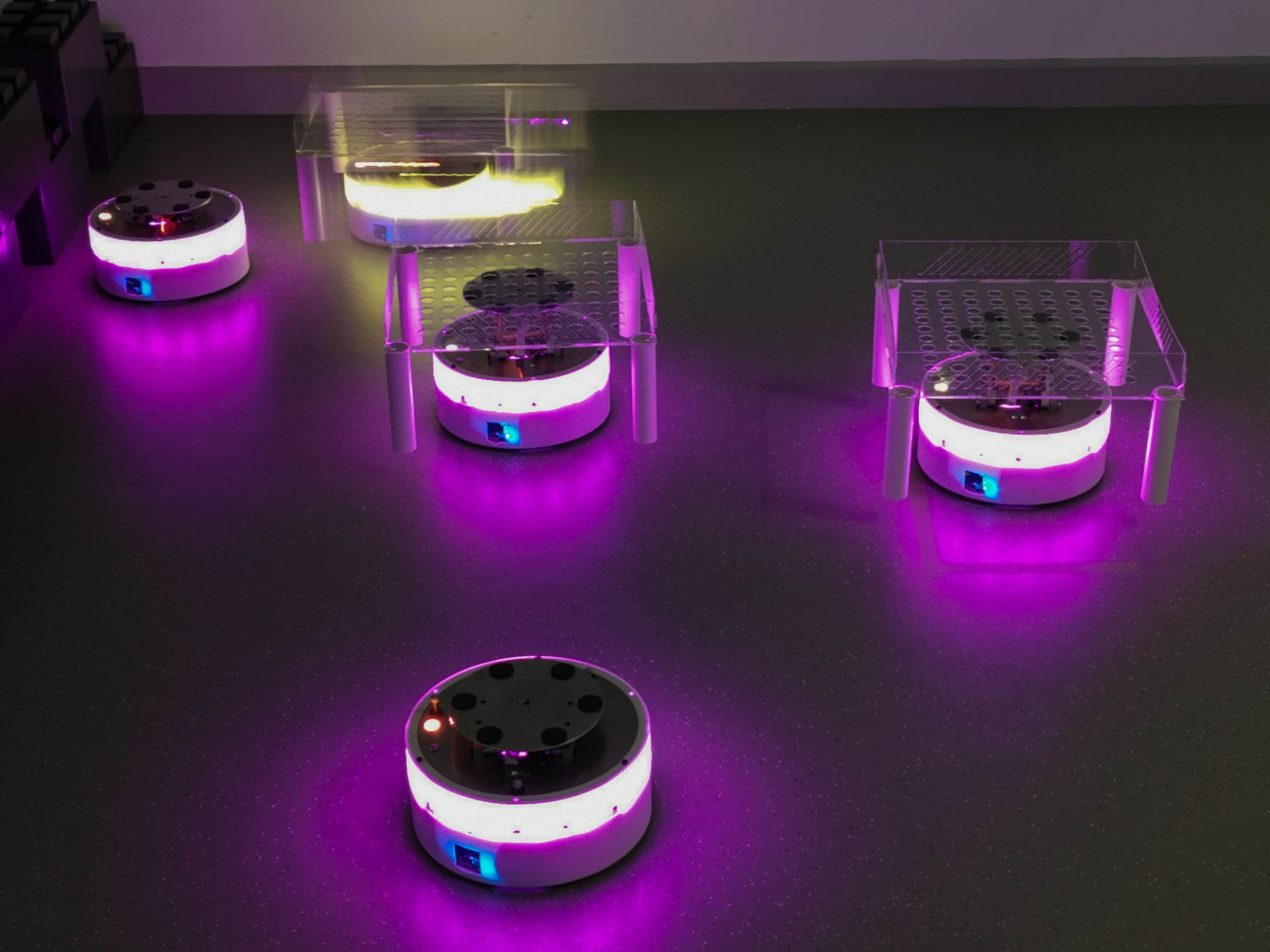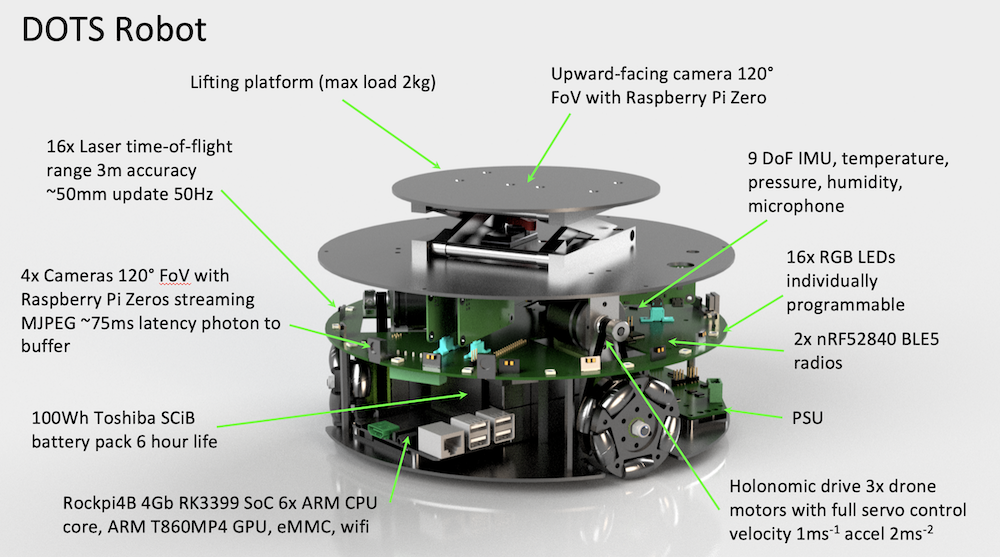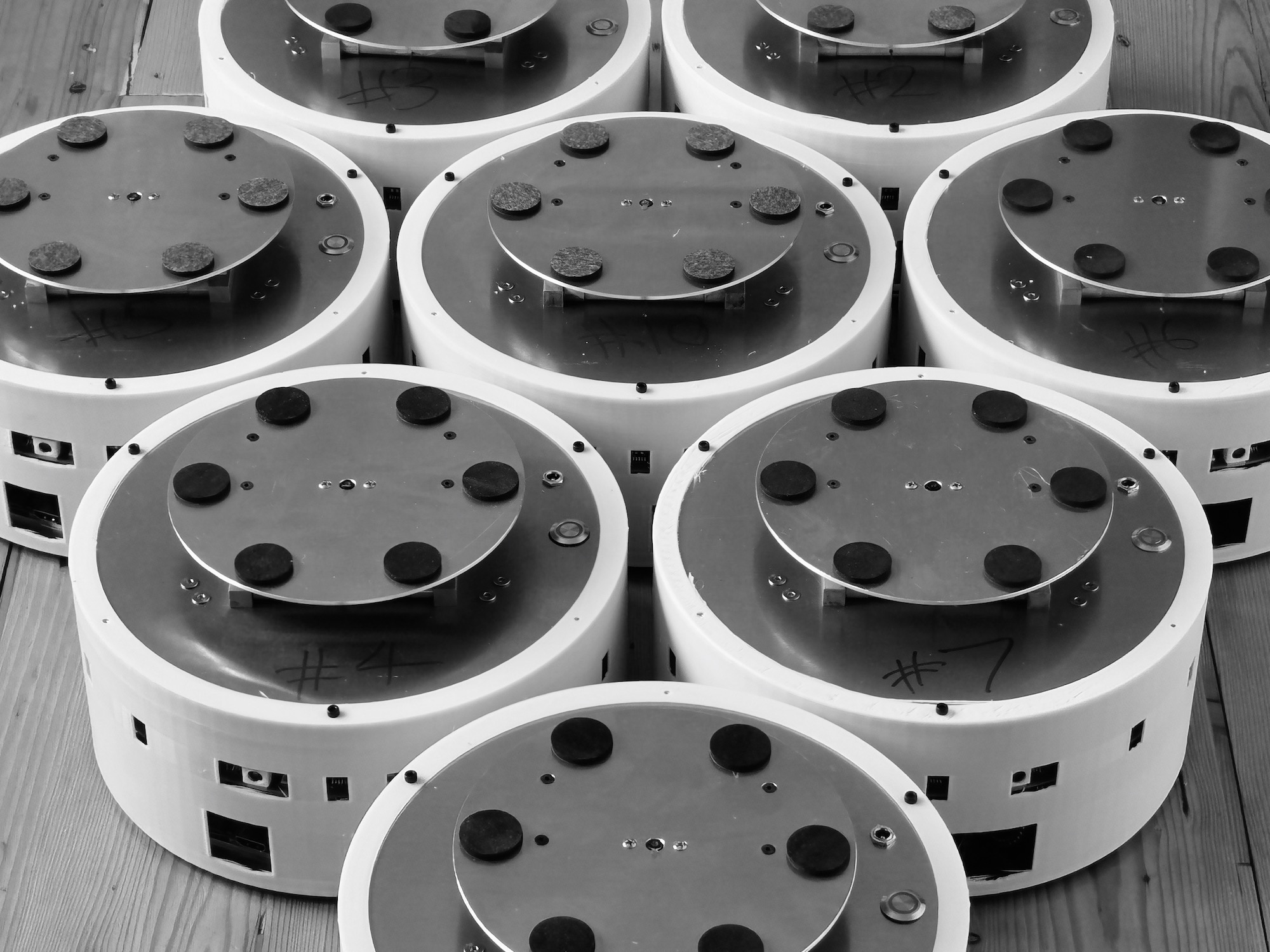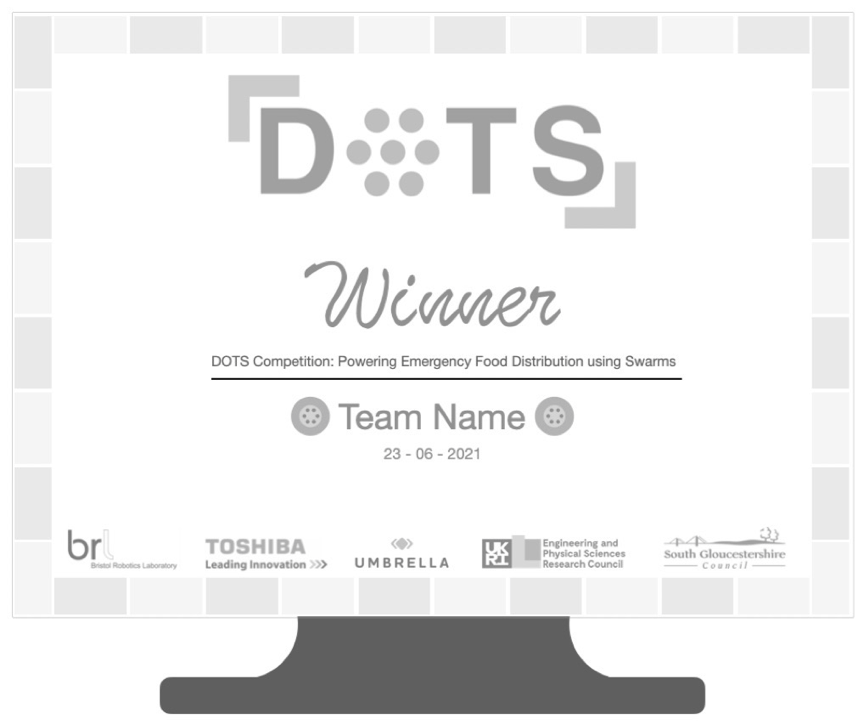
Robohub.org
Simulations, real robots, and bloopers from the DOTS competition: Powering emergency food distribution using swarms

Results from the DOTS competition were released yesterday, after an intense month with teams from around the world designing new algorithms for robot swarms tasked with delivering emergency food parcels.
The Scenario
Increases in the number of emergency food parcels distributed by food banks have accelerated over the course of the coronavirus pandemic, particularly in those going to children. Robot swarms could help streamline the distribution of these emergency food parcels, while freeing up time for volunteers and workers to interface with the users and provide human contact.
The hope is that swarms could be used out-of-the-box to power organisation and transport needs. You could use them to organise the stock room of a small retail shop, or retrieve boxes in a pop-up distribution centre for school lunches.
In the DOTS competition run jointly by the Bristol Robotics Laboratory, Toshiba Bristol Research and Innovation Laboratory and the South Gloucestershire Council’s UMBRELLA project, the robots used are called DOTS (Distributed Organisation and Transport Systems) and they fit the problem at hand: they don’t rely on maps or any complex infrastructure, making them both versatile and adaptable.
“After years of research in swarm algorithms and hardware, we’re now at stage where we can think of real-world applications. Robot swarms make so much sense as out-of-the-box solutions that can scale and adapt to a variety of messy real-world environments”, said Sabine Hauert, Associate Professor of Swarm Engineering and lead of the DOTS competition.
The Robots
The DOTS are custom-built 25cm robots, that move fast, have long battery life (8 hours), can communicate through 5G, WiFI, and bluetooth, house a GPU, and can sense the environment locally, as well as lift and transport payloads (2kg per robot). They are housed in the new Industrial Swarm Arena at the Bristol Robotics Laboratory, which is accessible remotely and 5G enabled.

“It’s taken three years to design and build the DOTS robots and simulator. I wanted the DOTS to individually be quite capable, with the latest sensing and computational capabilities so they could make sense of the world around them using distributed situational awareness. It’s been really rewarding to see them in action, and to see that others can use them too. Many of these robots were built at my house during lockdown where I have a dedicated workshop.” said Simon Jones, Research Fellow and designer of the DOTS at University of Bristol.

The Challenge
Over the past few weeks, participants in the competition have brainstormed and engineered solutions to tackle the challenge. The warehouse is a simulated 4m x 4m x 4m room in Gazebo with a 0.5m-wide strip along the right wall, acting as the dropoff zone. The 10 “carriers” that the robots must retrieve are scattered at random. Following the swarm robotics paradigm, each robot runs the same codebase: the challenge is therefore to engineer a solution where the emergent behaviour of the collective swarm results in fast retrieval.
One of the simplest solutions is for a robot to perform a random walk. As soon as a sensor detects a carrier, it can home in on the carrier and pick it up. Given enough time the robots will, collectively, retrieve all the carriers. From this basic implementation, more complex behaviours can be layered such as adding a bias for movement in a particular direction or having the robots interact to repulse or attract.
Of course, in the real world, the robots would have to contend with obstacles as well as faults in their hardware and software. The submitted solutions are also tested for their robustness and ability to overcome these hurdles. An extra level of complexity is added with the task of retrieving carriers in a given order.
“It’s been a great learning experience to see the whole pipeline from code to simulation to running with the real robots in the arena – feels like this is where progress is made towards that vision of robots integrated into our everyday lives”, said Suet Lee, PhD Student at University of Bristol who helped support the teams.
The Results
With 7 team submissions from around the world, it was exciting to see what solutions would emerge. In the end, scores were quite tight. For teams that needed extra time, we’ll be hosting a demo round later this summer.
The winners were Swarmanauts. The team included David Garzon Ramos, Jonas Kuckling, and Miquel Kegeleirs, PhD students at IRIDIA, the artificial intelligence lab of the Université libre de Bruxelles, Brussels, Belgium. They are all part of the ERC DEMIURGE project team (PI Mauro Birattari) where they investigate the automatic design of collective behaviours for robot swarms.
You can see their controller in action over the 6 tested scenarios here (unordered retrieval, unordered with lost robots, unordered with obstacles, ordered retrieval, ordered with lost robots, ordered with obstacles)
“It was exciting to participate in the DOTS competition. We enjoyed the challenge of devising and testing coordination strategies for an industry-oriented robot swarm. Next time we would like to also try automatic methods for designing the collective behavior of the robots”, said David.
In second came BusyB with team members Simon Obute and Ray Lei.
Ray and Simon had the following to say about their experience, “through this competition, our knowledge of controlling and sensing for robots has been enhanced. It was exciting that our simple algorithm inspired from chemotaxis search behaviour performed well in comparison to other competing strategies. The introduction session was also helpful, because it gave us the opportunity to meet and form the BusyB team. As a team, we now look forward to the next DOTS competition! Hope we can achieve more next year!”
And finally, in third we had Simple Solution by Hany Hamed and their feisty controller.
Winners will be receiving this fancy award at home soom.

There were plenty of bloopers along the way with all teams, here’s one sample of how things can go wrong in slow motion:
Finally, well done to all the other teams, UGA Hero Lab, Missing in Action, Str. Robot, and C5PO for their great submissions.
Translation to reality
In the end, a simulation is no substitute for a real world environment, as useful as it is for testing. What occurs is the “reality-gap”, the error that arises from the difference between the noisy real-world environment and the simplified simulation environment. Simon was able to demonstrate a baseline controller in reality in the video below. To help transfer, the same code designed in ROS2, is built to run both in simulation and reality. Some changes were needed, such as slowing down the robots to avoid motion blur on the cameras, but many of the behaviours translated well like the obstacle avoidance, and overall swarm strategy.
It was an amazing experience to work with our cool lab-built robots! I enjoyed designing Hardware kits and it was rewarding to see it all working in real-life.
Aswath G Indra, MSc Robotics Student at University of Bristol.
Next steps
For a first DOTS Competition, it was great fun and we’re really happy with what was achieved by all involved. We have many ideas for next year, like how to speed up computation, adding new tasks (like organising the warehouse), and will be looking to give more time to the teams to use the real hardware remotely.
Mahesh Sooriyabandara, Managing Director at the Toshiba Bristol Research and Innovation Laboratory, said “This is a great first step towards making an internet of robots and robot swarms that are useable out of the box. We’ve been working with the Bristol Robotics Laboratory for the past 3 years to build first the robots and then the new Industrial Swarm Arena. We’re hoping many can use this infrastructure in the future, running their code in a digital twin before transferring to the new swarm testbed”.
The DOTS Competition was supported by Simon Jones, Emma Milner, Suet Lee, James Wilson, Aswath Ganesan Indra, Sabine Hauert, and the Toshiba BRIL team.
tags: c-Research-Innovation, Competition-Challenge






